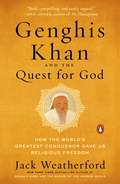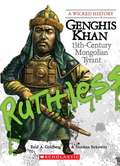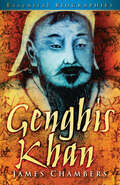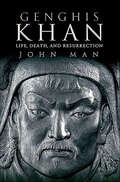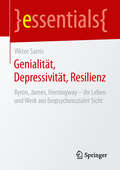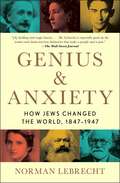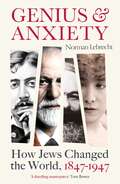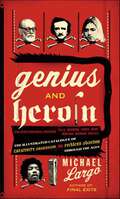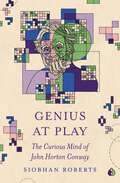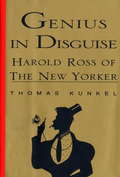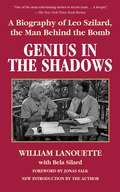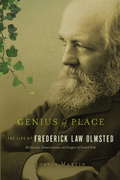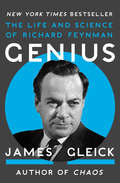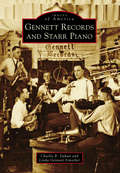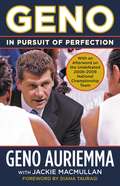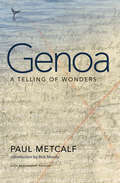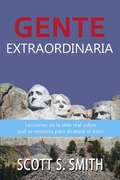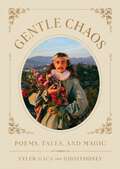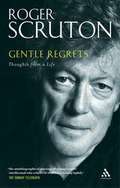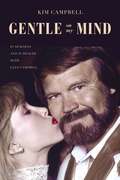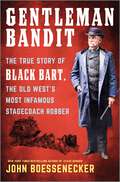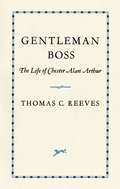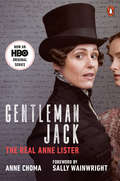- Table View
- List View
Genghis Khan and the Quest for God: How the World's Greatest Conqueror Gave Us Religious Freedom
by Jack WeatherfordA landmark biography by the New York Times bestselling author of Genghis Khan and the Making of the Modern World that reveals how Genghis harnessed the power of religion to rule the largest empire the world has ever known. Throughout history the world's greatest conquerors have made their mark not just on the battlefield, but in the societies they have transformed. Genghis Khan conquered by arms and bravery, but he ruled by commerce and religion. He created the world's greatest trading network and drastically lowered taxes for merchants, but he knew that if his empire was going to last, he would need something stronger and more binding than trade. He needed religion. And so, unlike the Christian, Taoist and Muslim conquerors who came before him, he gave his subjects freedom of religion. Genghis lived in the 13th century, but he struggled with many of the same problems we face today: How should one balance religious freedom with the need to reign in fanatics? Can one compel rival religions - driven by deep seated hatred--to live together in peace? A celebrated anthropologist whose bestselling Genghis Khan and the Making of the Modern World radically transformed our understanding of the Mongols and their legacy, Jack Weatherford has spent eighteen years exploring areas of Mongolia closed until the fall of the Soviet Union and researching The Secret History of the Mongols, an astonishing document written in code that was only recently discovered. He pored through archives and found groundbreaking evidence of Genghis's influence on the founding fathers and his essential impact on Thomas Jefferson. Genghis Khan and the Quest for God is a masterpiece of erudition and insight, his most personal and resonant work.From the Hardcover edition.
Genghis Khan: 13th Century Mongolian Tyrant (Wicked History Ser.)
by Norman Itzkowitz Enid GoldbergTraces the life and accomplishments of the Mongol conqueror who established the largest empire in history. <P><P>Lexile Measure: 680
Genghis Khan: Essential Biographies
by James ChambersGenghis Khan, the thirteenth century emperor, was infamous for his bloodthirsty, ruthless campaigns, but he was also one of the great commanders of history. Though a master of terror – his campaigns in northern China and Iran were accompanied by a level of slaughter that was not seen again until the twentieth century – he was just and generous to his subjects and often magnanimous in victory. His broad, ambitious strategies and elusive tactics were so far ahead of their time that they were acknowledged models for some of the most successful tank commanders of the Second World War. At the beginning of the thirteenth century Genghis Khan united the nomad tribes of Mongolia, turned them into a formidable army and led them to rule over the largest empire ever conquered by a single commander. By the time he died, in 1227, his dominions stretched eastward from the Caspian Sea to the shores of the Pacific Ocean.
Genghis Khan: Life, Death, and Resurrection
by John ManGenghis Khan is one of history's immortals, alive in memory as a scourge, hero, military genius and demi-god. To Muslims, Russians and westerners, he is a murderer of millions, a brutal oppressor. Yet in his homeland of Mongolia he is the revered father of the nation, and the Chinese honor him as the founder of a dynasty. In his so-called Mausoleum in Inner Mongolia, worshippers seek the blessing of his spirit. In a supreme paradox, the world's most ruthless conqueror has become a force for peace and reconciliation.As a teenager, Genghis was a fugitive, hiding from enemies on a remote mountainside. Yet he went on to found the world's greatest land empire and change the course of world history. Brilliant and original as well as ruthless, he ruled an empire twice the size of Rome's until his death in 1227 placed all at risk. To secure his conquests and then extend them, his heirs kept his death a secret, and secrecy has surrounded him ever since. His undiscovered grave, with its imagined treasures, remains the subject of intrigue and speculation.This is more than just a gripping account of Genghis' rise and conquests. John Man uses first-hand experiences in China and Mongolia to reveal the khan's enduring influence. He has traveled the length of the empire. He spotlights the tension between Mongols and Chinese, who both claim Genghis' spirit. He is the first writer to explore the hidden valley where Genghis is believed to have died, and one of the few westerners to climb the mountain where he was likely buried.This stunning narrative paints a vivid picture of the man himself, the places where he lived and fought, and the passions that surround him still. For in legend, ritual and intense controversy, Genghis lives on.
Genialität, Depressivität, Resilienz: Byron, James, Hemingway – ihr Leben und Werk aus biopsychosozialer Sicht
by Viktor SarrisDieses essential behandelt die psychischen Erkrankungen von Lord George Byron, William James und Ernest Hemingway – drei genialen Persönlichkeiten der Poesie, Wissenschaft und Literatur. Es wird untersucht, wie diese Genies mit ihrer schweren Depressivität zeit ihres Lebens umgegangen sind. Dabei interessiert besonders die Frage, welche psychischen Widerstände sie gegen ihre Depressionen mobilisieren konnten (Resilienz). Ihr persönliches Schicksal wird jeweils unter einem biopsychosozialen Blickwinkel der Möglichkeiten und Grenzen ihrer kognitiv-emotionalen Abwehrkräfte behandelt. Damit wird auch die Frage berührt, welche Bedeutung die Resilienz für die Kontrolle von Suizidalität hat.
Genie: An Abused Child's Flight from Silence
by Russ RymerGenie's father tied her to a chair when she was a child and secluded her in a room. When she was rescued she was a shrunken teenager who could hardly speak. But the scientists exploited this condition to learn about her language acquisition
Genius & Anxiety: How Jews Changed the World, 1847-1947
by Norman LebrechtA unique chronicle of the years 1847-1947, the century when the Jewish people changed the world—and it changed them.In a hundred-year period, a handful of men and women changed the way we see the world. Many of them are well known—Marx, Freud, Proust, Einstein, Kafka. Others have vanished from collective memory despite their enduring importance in our daily lives. Without Karl Landsteiner, for instance, there would be no blood transfusions or major surgery. Without Paul Ehrlich, no chemotherapy. Without Siegfried Marcus, no motor car. Without Rosalind Franklin, genetic science would look very different. Without Fritz Haber, there would not be enough food to sustain life on earth. What do these visionaries have in common? They all had Jewish origins. They all had a gift for thinking in wholly original, even earth-shattering ways. In 1847 the Jewish people made up less than 0.25% of the world&’s population, and yet they saw what others could not. How? Why? Norman Lebrecht has devoted half of his life to pondering and researching the mindset of the Jewish intellectuals, writers, scientists, and thinkers who turned the tides of history and shaped the world today as we know it. In Genius & Anxiety, Lebrecht begins with the Communist Manifesto in 1847 and ends in 1947, when Israel was founded. This robust, magnificent volume, beautifully designed, is an urgent and necessary celebration of Jewish genius and contribution.
Genius and Anxiety: How Jews Changed the World, 1847–1947
by Norman LebrechtMarx, Freud, Proust, Einstein, Bernhardt and Kafka. Between the middle of the nineteenth and twentieth centuries a few dozen men and women changed the way we see the world. But many have vanished from our collective memory despite their enduring importance in our daily lives. Without Karl Landsteiner, for instance, there would be no blood transfusions or major surgery. Without Paul Ehrlich no chemotherapy. Without Siegfried Marcus no motor car. Without Rosalind Franklin genetic science would look very different. Without Fritz Haber there would not be enough food to sustain life on earth. These visionaries all have something in common – their Jewish origins and a gift for thinking outside the box. In 1847 the Jewish people made up less than 0.25% of the world&’s population, and yet they saw what others could not. How?
Genius and Heroin: Creativity, Obsession and Reckless Abandon Through the Ages
by Michael LargoWhat is the price of brilliance?Why are so many creative geniuses also ruinously self-destructive? From Caravaggio to Jackson Pollack, from Arthur Rimbaud to Jack Kerouac, from Charlie Parker to Janis Joplin, to Kurt Cobain, and on and on, authors and artists throughout history have binged, pill-popped, injected, or poisoned themselves for their art. Fully illustrated and addictively readable, Genius and Heroin is the indispensable reference to the untidy lives of our greatest artists and thinkers, entertainingly chronicling how the notoriously creative lived and died—whether their ultimate downfalls were the result of opiates, alcohol, pot, absinthe, or the slow-motion suicide of obsession.
Genius at Play: The Curious Mind of John Horton Conway
by Siobhan RobertsA multifaceted biography of a brilliant mathematician and iconoclastA mathematician unlike any other, John Horton Conway (1937–2020) possessed a rock star&’s charisma, a polymath&’s promiscuous curiosity, and a sly sense of humor. Conway found fame as a barefoot professor at Cambridge, where he discovered the Conway groups in mathematical symmetry and the aptly named surreal numbers. He also invented the cult classic Game of Life, a cellular automaton that demonstrates how simplicity generates complexity—and provides an analogy for mathematics and the entire universe. Moving to Princeton in 1987, Conway used ropes, dice, pennies, coat hangers, and the occasional Slinky to illustrate his winning imagination and share his nerdish delights. Genius at Play tells the story of this ambassador-at-large for the beauties and joys of mathematics, lays bare Conway&’s personal and professional idiosyncrasies, and offers an intimate look into the mind of one of the twentieth century&’s most endearing and original intellectuals.
Genius in Disguise
by Thomas KunkelThis hugely entertaining biography of the founding editor of The New Yorker tells the diverting story of how Ross and the brilliant group of people he gathered around him--including James Thurber, Charles Addams, Dorothy Parker, and John O'Hara--devised the formula that made the magazine such a popular and critical success. Photos & cartoons.
Genius in the Shadows: A Biography of Leo Szilard, the Man Behind the Bomb
by William Lanouette Bela SilardThis biography presents the shy, witty, eccentric physicist Szilard, co-designer of the first nuclear reactor in 1942, who worked first to prevent, then to hasten, and finally to outlaw nuclear weapons. Annotation c. by Book News, Inc., Portland, OR.
Genius in the Shadows: A Biography of Leo Szilard, the Man Behind the Bomb
by William Lanouette Bela SilardWell-known names such as Albert Einstein, Enrico Fermi, J. Robert Oppenheimer, and Edward Teller are usually those that surround the creation of the atom bomb. One name that is rarely mentioned is Leo Szilard, known in scientific circles as "father of the atom bomb." The man who first developed the idea of harnessing energy from nuclear chain reactions, he is curiously buried with barely a trace in the history of this well-known and controversial topic.Born in Hungary and educated in Berlin, he escaped Hitler's Germany in 1933 and that first year developed his concept of nuclear chain reactions. In order to prevent Nazi scientists from stealing his ideas, he kept his theories secret, until he and Albert Einstein pressed the US government to research atomic reactions and designed the first nuclear reactor. Though he started his career out lobbying for civilian control of atomic energy, he concluded it with founding, in 1962, the first political action committee for arms control, the Council for a Livable World.Besides his career in atomic energy, he also studied biology and sparked ideas that won others the Nobel Prize. The Salk Institute for Biological Studies in La Jolla, California, where Szilard spent his final days, was developed from his concepts to blend science and social issues.
Genius of Place: The Life of Frederick Law Olmsted (A Merloyd Lawrence Book)
by Justin MartinFrederick Law Olmsted is arguably the most important historical figure that the average American knows the least about. Best remembered for his landscape architecture, from New York's Central Park to Boston's Emerald Necklace to Stanford University's campus, Olmsted was also an influential journalist, early voice for the environment, and abolitionist credited with helping dissuade England from joining the South in the Civil War. This momentous career was shadowed by a tragic personal life, also fully portrayed here.Most of all, he was a social reformer. He didn't simply create places that were beautiful in the abstract. An awesome and timeless intent stands behind Olmsted's designs, allowing his work to survive to the present day. With our urgent need to revitalize cities and a widespread yearning for green space, his work is more relevant now than it was during his lifetime. Justin Martin restores Olmsted to his rightful place in the pantheon of great Americans.
Genius: The Life and Science of Richard Feynman
by James GleickNew York Times Bestseller: This life story of the quirky physicist is &“a thorough and masterful portrait of one of the great minds of the century&” (The New York Review of Books). Raised in Depression-era Rockaway Beach, physicist Richard Feynman was irreverent, eccentric, and childishly enthusiastic—a new kind of scientist in a field that was in its infancy. His quick mastery of quantum mechanics earned him a place at Los Alamos working on the Manhattan Project under J. Robert Oppenheimer, where the giddy young man held his own among the nation&’s greatest minds. There, Feynman turned theory into practice, culminating in the Trinity test, on July 16, 1945, when the Atomic Age was born. He was only twenty-seven. And he was just getting started. In this sweeping biography, James Gleick captures the forceful personality of a great man, integrating Feynman&’s work and life in a way that is accessible to laymen and fascinating for the scientists who follow in his footsteps.
Gennett Records and Starr Piano (Images of America)
by Charlie B. Dahan Linda Gennett IrmscherThe Starr Piano Company, based in Richmond, Indiana, quickly became one of the largest piano manufacturers in the United States during the 19th century. In 1915, the Starr Piano Company opened a recording division, Gennett Records, that led to a dynamic change in the music industry and American culture. Gennett embraced the vastly under-recorded genres of jazz, blues, and country music in the 1920s. They recorded artists who were groundbreakers and innovators in both popular and vernacular music, including Louis Armstrong, Charley Patton, Gene Autry, Hoagy Carmichael, Blind Lemon Jefferson, Uncle Dave Macon, and Jelly Roll Morton, often for the first time. The company, like many others, suffered a steep decline in the sale of their pianos and records due to the Great Depression, but the music recorded at Gennett continues to reach new generations and influence musicians as they discover it on reissues and streaming media services.
Geno: In Pursuit of Perfection
by Geno AuriemmaControversial, confrontational, and driven, Coach Geno Auriemma is a force to be reckoned with - and the most accomplished male coach in women's basketball today. In his relentless quest for excellence at the University of Connecticut, he has led the Huskies to five national championships. Yet his soul never rests. For Auriemma, life affords only the briefest moments of happiness - a good round of golf, forty minutes of great basketball, a day at the beach with his family, a nice glass of wine - while disaster is seemingly always waiting to strike. It's a fatalistic philosophy, a remnant of his hardscrabble early years, but it's an outlook that has driven him to unparalleled success." In this deeply personal memoir, Geno Auriemma reveals for the first time the man behind the legend. He talks candidly about his coaching style - famed for being one of the most demanding in all the sports world. He spills the beans about his stormy dealings with other coaches such as his archrival, Pat Summitt of the University of Tennessee. And with warmth and a genuine love for his champions, he writes openly about Diana Taurasi, Sue Bird, Nykesha Sales, Rebecca Lobo, Swin Cash, and all of his other UConn stars who have gone on to stellar WNBA careers. You get a courtside seat to all of the action - including an epilogue on the 2004-05 season, as well as interviews with the team's most celebrated players.
Genoa: A Telling of Wonders
by Rick Moody Paul Metcalf"[Genoa] invites us to pass our minds down a new but ancient track, to become, ourselves, both fact and fiction, and to discover something true about the geography of time."--William Gass, The New York Times"Genoa is a spectacular confrontation with Melville's work, the journals of Columbus and molecular biology--all folded into a hallucinatory narrative about two brothers and their different paths through the American century."--Publishers Weekly"Much like his great-grandfather, Herman Melville, Paul Metcalf brings an extraordinary diversity of materials into the complex patterns of analogy and metaphor, to affect a common term altogether brilliant in its imagination."--Robert Creeley"A unique work of historical and literary imagination, eloquent and powerful. I know of nothing like it."--Howard ZinnFirst published in 1965, Genoa is Paul Metcalf's purging of the burden of his relationship to his great-grandfather Herman Melville. In his signature polyphonic style, a storm-tossed Indiana attic becomes the site of a reckoning with the life of Melville; with Columbus, and his myth; and between two brothers--one, an MD who refuses to practice; the other, an executed murderer. Genoa is a triumph, a novel without peer, that vibrates and sings a quintessentially American song.Paul Metcalf (1917-99) was an American writer and the great-grandson of Herman Melville. His three volume Collected Works were published by Coffee House Press in 1996.
Gente Extraordinaria
by Terry Savage Scott S Smith Alma Edith GarciaEn Gente Extraordinaria: Lecciones de la vida real sobre qué se necesita para alcanzar el éxito, Scott S. Smith, que contribuye a la columna "Leaders & Success" ("Líderes y Éxito") del periódico Investor's Business Daily se basa en su experiencia como empresario y reportero de negocios para mostrarle a sus lectores los rasgos y comportamientos en común que suelen tener las personas exitosas. Estos pueden incluir la valentía, la voluntad de hacer cambios dramáticos, el optimismo, tener una imaginación innovadora y la persistencia frente a la adversidad. Los lectores aprenderán sobre personas fascinantes, tales como: el músico Ray Charles; Martha Harper, inventora del sistema de franquicias; Simon Bolívar, liberador de seis naciones Sudamericanas y la novelista Anne Rice, y a través de sus historias podrán ver qué se necesita para alcanzar el éxito duradero.
Gentle Chaos: Poems, Tales, and Magic
by Tyler GacaFrom the wild imagination of Tyler Gaca, also known as TikTok's Ghosthoney, comes a beautiful compendium of poems, images, personal stories, and vignettes that explore magic, queerness, Tyler&’s unique story, and the enchantment and comfort to be found in the weird, the dark, and the different. In this raw yet enchanting collection of poems, essays, photographs, and artworks, Tyler Gaca dreamily navigates themes of magic and queerness, offering readers an intimate look inside his mind and his worlds, real and imagined. The writings in Gentle Chaos reflect on growing up queer and in love with magic, discovering yourself and your place in the world, and daring to seek out love and hope. The artworks are dedicated to salvaged antique photographs, haircuts, dead moths, the creatures we dream up, and much more. The result is a whimsical, vulnerable, and transporting journey into the gentle chaos within us all.
Gentle Regrets: Thoughts from a life
by Roger ScrutonIn this book the author takes us on a few autobiographical excursions and shares in a moving account the ways in which life brought him to think what he thinks, and to be what he is.
Gentle on My Mind: In Sickness and in Health with Glen Campbell
by Kim CampbellThe page-turning, never-before-told story of Kim Campbell's roller-coaster thirty-four-year marriage to music legend Glen Campbell, including how Kim helped Glen finally conquer his addictions only to face their greatest challenge when he was diagnosed with Alzheimer's disease.Kim Campbell was a fresh-faced twenty-two-year-old dancer at Radio City Music Hall when a friend introduced her to Glen Campbell, the chart-topping, Grammy-winning, Oscar-nominated entertainer. The two performers from small Southern towns quickly fell in love, a bond that produced a thirty-four-year marriage and three children.In Gentle on My Mind, Kim tells the complete, no-holds-barred story of their relationship, recounting the highest of highs—award shows, acclaimed performances, the birth of their children, encounters with Mick Fleetwood, Waylon Jennings, Alan Jackson, Alice Cooper, Jane Seymour, and others—and the lowest of lows, including battles with alcohol and drug addiction and, finally, Glen&’s diagnosis, decline, and death from Alzheimer's. With extraordinary candor, astonishing bravery, and a lively sense of humor, Kim reveals the whole truth of life with an entertainment giant and of caring for and loving him amid the extraordinary challenge of Alzheimer's disease. This is a remarkable account of enduring love, quiet strength, and never-faltering faith.
Gentleman Bandit: The True Story of Black Bart, the Old West's Most Infamous Stagecoach Robber
by John BoesseneckerNew York Times bestselling author and award-winning historian John Boessenecker separates fact from fiction in the first new biography in decades of Black Bart, the Wild West&’s most mysterious gentleman bandit.Black Bart is widely regarded today as not only the most notorious stage robber of the Old West but also the best behaved. Over his lifetime, Black Bart held up at least twenty-nine stagecoaches in California and Oregon with mild, polite commands, stealing from Wells Fargo and the US mail but never robbing a passenger. Such behavior earned him the title of a true &“gentleman bandit.&”His real name was Charles E. Boles, and in the public eye, Charles lived quietly as a boulevardier in San Francisco, the wealthiest and most exciting city in the American West. Boles was an educated man who traveled among respectable crowds. Because he did not drink, fight or consort with prostitutes, his true calling as America&’s greatest stage robber was never suspected until his final capture in 1883. Sheriffs searched and struggled for years to find him, and newspaper editors had a field day reporting his exploits. Legends and rumors trailed his name until his mysterious death, and his ultimate fate remains one of the greatest mysteries of the Old West.Now historian John Boessenecker sheds new light on Black Bart&’s beginnings, reputation and exploits, bringing to life the glittering story of the mysterious stage robber who doubled as a rich, genteel socialite in the golden era of the Wild West.
Gentleman Jack (Movie Tie-In): The Real Anne Lister
by Anne ChomaIn 1834, Anne Lister made history by celebrating and recording the first ever known marriage to another woman. Now the basis for the HBO series Gentleman Jack, this is her remarkable, true story. Anne Lister was extraordinary. Fearless, charismatic and determined to explore her lesbian sexuality, she forged her own path in a society that had no language to define her. She was a landowner, an industrialist and a prolific diarist, whose output has secured her legacy as one of the most fascinating figures of the 19th century. Gentleman Jack: The Real Anne Lister follows Anne from her crumbling ancestral home in Yorkshire to the glittering courts of Denmark as she resolves to put past heartbreak behind her and find herself a wife. This book introduces the real Gentleman Jack, featuring unpublished journal extracts decrypted for the first time by series creator Sally Wainwright and writer Anne Choma.
